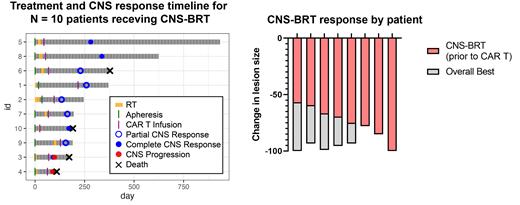Introduction: Up to 80% of patients who receive CAR T-cell therapy (CAR T) for central nervous system lymphoma (CNSL) require bridging therapy, yet optimal regimens remain undefined. Radiotherapy is an established strategy for extracranial lymphoma that provides beneficial cytoreduction. However, CNS bridging radiotherapy (CNS-BRT) prior to CAR T is controversial due to concerns of potential enhanced neurotoxicity. We explored the safety and response profiles in patients treated with CNS-BRT prior to CAR T.
Methods: We identified patients with non-hodgkin B-cell lymphoma who received CNS-BRT at our institution prior to commercial CAR T infusion. CNS-BRT was defined as treatment delivered between apheresis and CAR T infusion or within 30 days prior to apheresis, targeting the CNS parenchyma, leptomeninges, or epidural spine. Patients with epidural spine disease were included since the adjacent spinal cord is part of the treatment field. Safety was evaluated by rate of cytokine release syndrome (CRS) and immune effector associated neurotoxicity syndrome (ICANS) after CAR T. Best CNS response post CAR T was evaluated using the International Primary CNS Lymphoma Collaborative Group (IPCG) or Response Assessment in Neuro-Oncology (RANO) for parenchymal or leptomeningeal lesions, respectively. Cytoreduction from CNS-BRT was estimated by calculating the change in lesion size (sum of product diameter) from before and after CNS-BRT, but before CAR T infusion. Risk of any CNS relapse after CAR T was estimated using the Gray's method with death as a competing risk. Patients with epidural spine disease were not evaluate for CNS response or relapse.
Results: 12 patients received CNS-BRT with median follow up of 8.5 months (range: 3.2 - 30.2), median age of 60 (30-76), median Karnofsky Performance Status (KPS) of 80 (range: 50 - 90). Histologies included diffuse large B cell (DLBCL) (n = 9), mantle cell (n = 2), and Burkitt lymphoma (n = 1), with disease localizing to the brain parenchyma (n = 6), leptomeninges (n = 4), and epidural spine (n = 2). 9 patients had secondary CNSL and 1 patient had primary CNSL. Prior to CNS-BRT, 11/12 patients had progressive disease. 5/12 patients had disease outside of the CNS. 5/12 patients received prior autologous hematopoietic stem cell transplantation. 9/12 patients received prior high dose methotrexate with median 46-day interval to CNS-BRT (range: 0 - 393). RT targets included whole brain (n = 3), involved site (partial) brain (n = 4), involved site spine (n = 4), and orbits (n = 1) with median dose 24 Gy (range: 15 - 33). CAR T products included Tisagenlecleucel (n = 4), Lisocabtagene maraleucel (n = 7), and Axicabtagene ciloleucel (n = 1). Among 10 patients with available toxicity grading, 6/10 experienced CRS (n = 1 grade (G) 1, n = 4 G2, and n = 1 G3), and 3/10 experienced ICANS (n = 1 G1, n = 1 G3, n = 1 G4). 6/10 patients required tocilizumab and/or steroids. CNS-BRT achieved a 74.4% (95% CI, 62.9 - 85.9) mean reduction in lesion size prior to CAR T infusion. Best CNS response after CAR T infusion included 3 complete responses (CR), 6 partial responses (PR), and 1 progressive disease (PD). The patients who achieved PR remained in PR at last follow up. The 12-month estimated risk of CNS progression after CNS-BRT and CAR T infusion was 20.0% (95% CI, 3- 49). CNS progression was not observed in patients who received involved site brain RT.
Conclusion: Preliminary data suggest CNS-BRT achieves rapid cytoreduction prior to CAR T therapy and is associated with a favorable CNS response profile. While overall numbers are limited to date, the rate of severe CRS and ICANS is similar to that of historical series of CNSL patients treated with CAR T. However, a larger cohort will be required to determine the safety of CNS-BRT. These data support further study of RT, and exploration of involved site brain RT, as an effective bridging modality for CAR T-cell therapy in CNSL.
Disclosures
Shah:ArcellX: Other: DSMB; Beyond Spring: Research Funding; Amgen: Research Funding; BMS: Research Funding; Janssen: Research Funding. Palomba:BMS: Honoraria; Cellectar: Honoraria; Ceramedix: Honoraria; Juno: Honoraria, Patents & Royalties; Kite: Honoraria; MustangBio: Honoraria; GarudaTherapeutics: Honoraria; Novartis: Honoraria; Pluto Immunotherapeutics: Honoraria; Rheos: Honoraria; Seres Therapeutics: Honoraria, Patents & Royalties; Smart Immune: Honoraria; Thymofox: Honoraria; Synthekine: Honoraria. Perales:Incyte: Consultancy, Honoraria, Research Funding; Astellas: Consultancy, Honoraria; Allovir: Consultancy; AbbVie: Consultancy, Honoraria; Orcabio: Consultancy, Current equity holder in publicly-traded company, Honoraria; BMS: Consultancy, Honoraria; Caribou: Consultancy, Honoraria; Equillium: Consultancy, Honoraria; Exevir: Consultancy, Honoraria; Karyopharm: Consultancy, Honoraria; Merck: Consultancy, Honoraria; Miltenyi Biotec: Consultancy, Honoraria, Research Funding; MorphoSys: Consultancy, Honoraria; Takeda: Consultancy, Honoraria; VectivBio AG: Consultancy, Honoraria; Vor Biopharma: Consultancy, Honoraria; Adicet: Honoraria; Celgene: Honoraria; Syncopation: Honoraria; Cidara Therapeutics: Consultancy, Other; Medigene: Consultancy, Other; Sellas Life Sciences: Consultancy; NexImmune: Consultancy, Current equity holder in publicly-traded company; Servier: Other; Miltenyi Biotec: Honoraria; DSMB: Other; Allogene: Research Funding; Omeros: Consultancy, Current equity holder in publicly-traded company, Honoraria; Novartis: Consultancy, Honoraria, Research Funding; Nektar Therapeutics: Consultancy, Honoraria, Research Funding; Kite: Consultancy, Honoraria, Research Funding. Salles:Nordic Nanovector: Consultancy; Nurix: Consultancy; Orna: Consultancy; ATB Therapeutics: Consultancy; Owkin: Current holder of stock options in a privately-held company; Ipsen: Consultancy, Research Funding; Molecular Partners: Consultancy; Merck: Consultancy, Honoraria; Novartis: Consultancy; BeiGene: Consultancy; Janssen: Consultancy, Research Funding; Loxo/Lilly: Consultancy; BMS/Celgene: Consultancy; Debiopharm: Consultancy; Incyte: Consultancy; Genmab: Consultancy; Kite/Gilead: Consultancy; EPIZYME: Consultancy; Genentech, Inc./F. Hoffmann-La Roche Ltd: Consultancy, Research Funding; AbbVie: Consultancy, Honoraria. Falchi:Genmab: Consultancy, Research Funding; Roche: Consultancy, Research Funding; Genentech: Consultancy, Other: Advisory Board, Research Funding; Abbvie: Consultancy, Other: Advisory Board, Research Funding; Seagen: Other: Advisory Board; ADC Therapeutics: Other: Advisory Board; AstraZeneca: Consultancy. Grommes:BTG International: Other: Provision of services; Ono Pharma: Other: Provision of services; Roche: Other: Provision of services. Scordo:Medscape, LLC: Honoraria; CancertNetwork (Intellisphere LLC): Honoraria; Amgen, Inc.: Research Funding; Omeros Corporation: Consultancy, Research Funding; Angiocrine Bioscience, Inc.: Research Funding. Yahalom:Convergent R.N.R Ltd.: Other: Provision of Services (uncompensated). Imber:GT Medical Technologies: Honoraria.


This feature is available to Subscribers Only
Sign In or Create an Account Close Modal